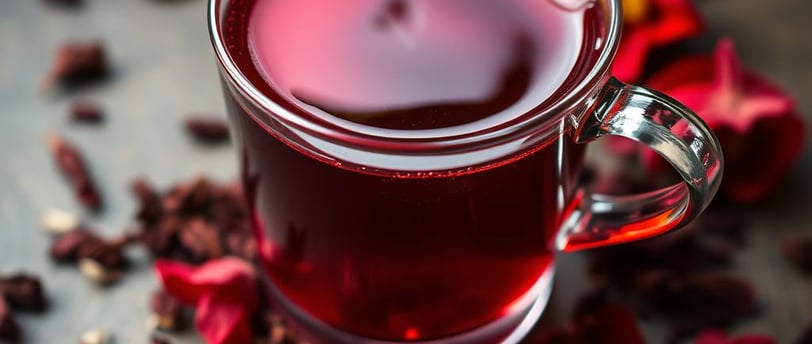Try Hibiscus Tea for Blood Pressure Control – Known to Naturally Support Heart HealthTry Hibiscus Tea for Blood Pressure Control – Known to Naturally Support Heart Health
🧘WELLNESS TIPSHEART HEALTH & CIRCULATION❤️


In the quest for natural remedies to support heart health and manage blood pressure, hibiscus tea has emerged as a promising contender. This herbal tea, derived from the vibrant and tangy hibiscus flower, has been used for centuries in various cultures for its potential health benefits. Recent scientific evidence has shed light on its efficacy in controlling blood pressure, making it a valuable addition to a heart-healthy lifestyle.
The Science Behind Hibiscus Tea
Hibiscus tea, made from the dried calyces of the Hibiscus sabdariffa plant, is rich in antioxidants, flavonoids, and other bioactive compounds. These components are believed to contribute to its potential cardiovascular benefits. One of the key active compounds in hibiscus tea is anthocyanins, which are known for their anti-inflammatory and antioxidant properties.
A 2019 review published in the Journal of Hypertension summarized the findings of several clinical trials and studies on hibiscus tea. The review highlighted that regular consumption of hibiscus tea can lead to a significant reduction in both systolic and diastolic blood pressure. This is particularly beneficial for individuals with mild to moderate hypertension.
How Hibiscus Tea Works
The mechanism by which hibiscus tea helps control blood pressure is multifaceted. Here are some of the ways it contributes to heart health:
Vasodilatory Effects: Hibiscus tea can help relax and dilate blood vessels, reducing the resistance to blood flow and thereby lowering blood pressure. This effect is attributed to the presence of anthocyanins and other bioactive compounds.
Antioxidant Properties: The antioxidants in hibiscus tea can reduce oxidative stress, which is a key factor in the development of cardiovascular diseases. By neutralizing free radicals, these antioxidants help protect the heart and blood vessels.
Anti-inflammatory Action: Chronic inflammation is another factor that can contribute to high blood pressure. Hibiscus tea's anti-inflammatory properties can help mitigate this risk and support overall cardiovascular health.
Diuretic Action: Some studies suggest that hibiscus tea has a mild diuretic effect, which can help reduce blood volume and, consequently, lower blood pressure.
Clinical Studies and Evidence
Several clinical studies have provided scientific evidence supporting the use of hibiscus tea for blood pressure control. For instance, a randomized controlled trial published in the British Journal of Nutrition found that participants who consumed hibiscus tea twice daily for six weeks experienced a significant reduction in blood pressure compared to those who consumed a placebo.
Another study published in the Phytomedicine journal reported similar findings, noting that hibiscus tea consumption led to a decrease in both systolic and diastolic blood pressure in hypertensive patients. These studies, along with others, collectively suggest that hibiscus tea can be a beneficial addition to a heart-healthy diet.
Preparing Hibiscus Tea
Preparing hibiscus tea is simple and can be done in a few easy steps:
Gather Ingredients: You will need dried hibiscus flowers, which can be found in most health food stores or online. You can also use hibiscus tea bags for convenience.
Boil Water: Bring a pot of water to a boil.
Steep the Tea: Add one to two teaspoons of dried hibiscus flowers or one tea bag to the boiling water. Allow it to steep for 3-5 minutes.
Strain and Serve: Strain the tea into a cup and serve it warm. You can add honey, lemon, or other natural sweeteners to enhance the flavor.
Potential Side Effects and Precautions
While hibiscus tea is generally safe for most people, it is important to be aware of potential side effects and precautions:
Pregnancy and Breastfeeding: Pregnant or breastfeeding women should consult a healthcare provider before consuming hibiscus tea, as its effects on fetal development and lactation are not well-documented.
Medications: Hibiscus tea may interact with certain medications, including those for blood pressure and diabetes. It is advisable to consult a healthcare professional if you are taking any medications.
Allergies: Some individuals may be allergic to hibiscus. If you experience any allergic reactions, such as itching or swelling, discontinue use and seek medical advice.
Conclusion
Hibiscus tea is a natural and flavorful way to support heart health and manage blood pressure. Supported by scientific evidence, it offers a range of benefits that can contribute to a healthier cardiovascular system. Whether you are looking to maintain a healthy blood pressure level or manage mild to moderate hypertension, incorporating hibiscus tea into your daily routine may be a valuable addition to your overall health strategy. As with any dietary supplement, it is always recommended to consult with a healthcare provider before making significant changes to your diet, especially if you have existing health conditions or are taking medications.
